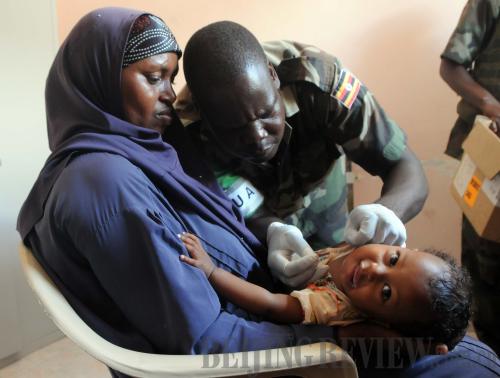|
|

|
|
WORK IN PROGRESS: Despite Africa's achievements, disease and conflict in Somalia remain a massive challenge (LIU CHAN) |
 |
|
WORK IN PROGRESS: Despite Africa's achievements, disease and conflict in Somalia remain a massive challenge (XINHUA) |
Work in progress
Despite of all this progress, some challenges still exist in the development process of African countries, which cannot be overlooked.
Political systems and good governance. After independence, African countries were committed to political power construction, but some countries failed to obtain satisfactory results. Governments of some African countries needed to take equal and balanced consideration of the representatives from different ethnic groups and regions, an issue that leads to increase of government size and increasing number of public servants. Oversized governments may on one hand result in unwanted contradictions; on the other hand, when a government size is too small, it may lack representativeness and cannot provide competent services. This is a problem African countries should take into consideration in their future development. After the implementation of structural adjustment in the late 20th century, almost all the African countries underwent privatization. It is acceptable to adopt privatization policy, but it should be implemented legally.
Non-governmental organizations. In general, African governments welcome the development-oriented non-governmental organizations (NGOs), but often negate those independent think-tanks as these organizations usually challenge governments' efforts in implementing policies. In addition a recent survey shows that the aid supplied by NGOs in Africa is three times that of governments. Meanwhile, NGOs can also help prevent power abuse, supervise elections, support marginalized groups and provide development opportunities. Most importantly, they can help establish the basis for a civil society that can promote political and economic reforms. However, foreign countries finance most of these NGOs and hence foreign donors usually influence their activities. African countries are facing the challenges of how to reasonably utilize the forces of NGOs in solving their practical problems, such as good governance and economic development, and how to prevent the organizations from becoming the tools for foreign donors to realize their own goals.
Food security. Africa boasts a vast area and was the origin of grain production. However, agricultural production is an intractable problem for the continent today. Most African countries cannot feed themselves because of various domestic and international factors and interventions. They need food assistances and imports. But the soaring food prices in the international market and the international financial crisis have caused great difficulties for African countries in gaining enough food. To make things worse, the rainfall in Africa has been declining since 1986; during the decade from 1990 to 2000, the forest area in the continent reduced by 50 million hectares. All these have worsened food security in Africa. To cope with the problem, the African Development Bank decided to invest $1 billion in 2008 to promote development of agricultural infrastructures and agricultural researches.
Population problems. Population is the core element in the long-term social and economic development in Africa. However, African countries are facing a severe situation in population growth. The annual population growth in Africa is 3 percent, much higher than the world average of 1.2 percent. Meanwhile, children's proportion in the population structure is increasing, with half of them being under 15. The latest statistics show that in 2008, the population in Africa reached 967 million and the figure is expected to reach 1.9 billion in 2050. Against the background of fast population growth, African countries are facing severe challenges of reducing poverty and increasing student enrolment rate. However, owing to the incomplete public health system, of the 7 million infants who die every year in the world, 5 million are from Sub-Saharan Africa. By the end of 2007, people living with HIV/AIDS in Africa accounted for 67 percent of the world total. The high mortality rate and high HIV/AIDS infection rate lead to the high birth rate in the continent. To solve these problems, African countries need stable politics, economic development, improvement of livelihood, increase of education and sanitation levels and proper guide of birth policies. Properly solving the problem can greatly promote economic development and social progress in Africa.
Root causes
Actually, Africans should not be blamed for all these problems and frustrations. Starting from the 1960s, Western powers have been sparing no efforts to exert influences upon Africa. They have devised various development programs for African countries with the conditions of providing aid and technical supports. From Rostow modernization theory to various development strategies and from the "Burg Report" to the "Washington Consensus," African countries have to carry out reforms designed by Western countries in order to get aid from them. Actually, these reforms are not suitable for their national realities. However, when all these attempts proved to be a failure, African leaders are often blamed. It is unfair for them.
After 50 years of development after independence, most African countries have entered a stable development period. Abundant resources are providing solid basis for their development and the international economic order is expected to be changed gradually. Against this background, so long as African countries are committed to face their problems and solve them, the continent's development will be greatly accelerated.
(The author is director of the Center for African Studies, School of International Studies of Peking University) |